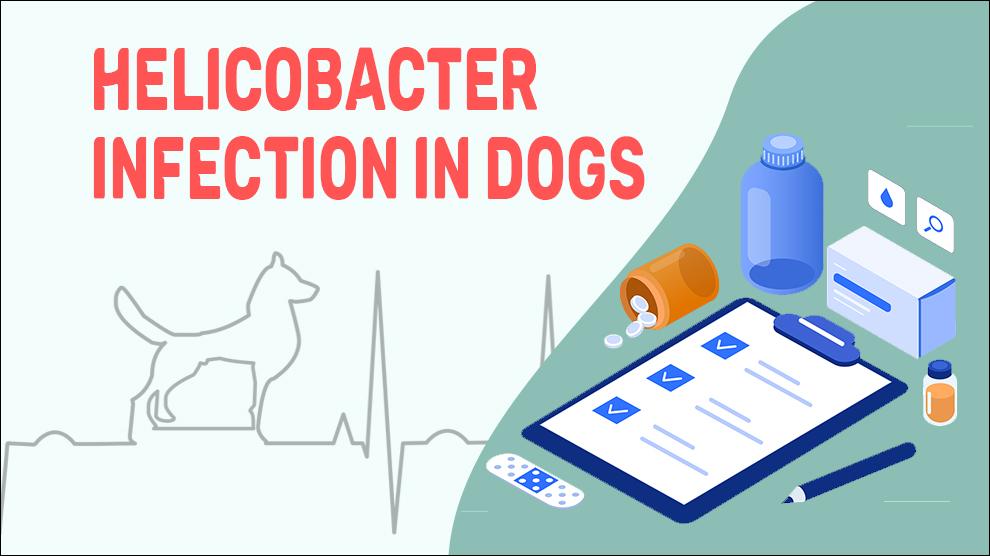What Is Helicobacter Infection In Dogs?
Helicobacter species are Gram-negative, motile, microaerophilic, acid-labile facultative bacilli. There are around 40 different types of Helicobacter species that have been identified in different animals.
Helicobacter infection in dogs and humans is caused by a gastric pathogen called Helicobacter pylori. H. pylori strains are genetically diverse and colonize almost half of the world population. Dogs are also affected by other types of gastric Heliobacter such as Helicobacter Heilmannii and Helicobacter Felis.
Sometimes, healthy dogs may also carry Heliobacter bacteria in their GI tracts like mammals and livestock. The predominant gastric Helicobacter spp in dogs are H. Bizzozeronii, H. Heilmannii Sensu Stricto, H. Felis, and H. Salomonis.
Heliobacter is mostly a gastrointestinal (local) pathogen, but can also cause serious systemic infection (enteric fever), and sometimes dogs can be an asymptomatic carrier of Heliobacter. If a dog gets affected by Heliobacter species, they may still go undetected as mostly the signs are nonspecific. The symptoms of Heliobacter can be attributable to many different canine health problems.
As they are zoonotic pathogens, Infection between infected animals and between humans and animals is possible. Salmonella spreads mainly through fecal-oral contamination or by fomite-associated transmission (contaminated things). Contaminated food and water are the main sources of infection.
Symptoms Of Helicobacter Infection In Dogs
- Diarrhea that may contain blood or mucus
- Vomiting
- Abdominal pain
- Fatigue/ dehydration
- Fever
- Loss of appetite
Treatment Options For Helicobacter Infection In Dogs
- Intravenous fluid and nutritional therapy will be given to help your dog not become severely dehydrated.
- Your vet keeps your dog hydrated and only treats the symptoms while the disease runs its course.
- Immunosuppressive or anti-inflammatory medications.
- Anti-diarrhea medications.
- Broad-spectrum antibiotics- ampicillin, omeprazole, metronidazole, and tetracycline.
Home Remedies For Helicobacter Infection In Dogs
- Keep the affected dog in isolation and after they are deemed recovered for at least two more months.
- Make sure that your dog gets appropriate medications.
- Limit the exposure of puppies to other dogs that may be infected or carrying the infection until they have completed their treatment.
- Even after recovery, your dog may not be in good health for a while, be aware that it takes time to fully recover and give them enough space until your dog is back to full health.
How To Prevent Helicobacter Infection In Dogs?
- Avoid giving your dog raw or undercooked meats from suspected sources.
- Feed high-quality food and exercise regularly.
- Follow the annual dewormer protocol for dogs as suggested by your vet to maintain gut health.
- Prompt detection (performing fecal tests 2-4 times yearly for adult dogs).
- Clean up backyard periodically; maintain sanitary and hygienic conditions in the home.
Affected Dog Breeds Of Helicobacter Infection
There is no breed disposition.
Additional Facts For Helicobacter Infection In Dogs
1. Risk factors:
- Old dogs/Immunocompromised condition
- Poor nutrition- raw or undercooked meat
- Presence of cancer or neoplasia
- Other concurrent diseases
- Administration of antibiotics, steroids, or chemotherapy
2. Causes:
- Direct contact with infected dogs in boarding/kenneling situations, dogs in Poor sanitary conditions or overcrowded areas, shelters, etc
- Transplacentally to the fetuses
- Direct contact with surface pathogens in clothing, bowls, etc
- Ingestion of infected fecal matter
3. Mortality:
The mortality rate from Heliobacter infection in dogs is very rare.
4. Diagnosis:
- Complete blood count (CBC), blood chemistry profile
- Electrolyte panel
- Urinalysis
- Antigen test (enzyme immunoassay or EIA)
5. Prognosis:
Although in healthy dogs, Heliobacter infection cures on its own. Recovery from Heliobacter infections varies case by case. Complete recovery depends on the severity of the disease and the damage it has done. Without treatment, the survival rate of puppies/older dogs/ dogs with extremely poor gut health significantly decreases.
When To See A Vet For Helicobacter Infection In Dogs?
Contact your vet right away, if you notice any of the following:
- Vomiting
- Frequent diarrhea that may contain blood or mucus
Food Suggestions For Helicobacter Infection In Dogs
- A short-term fast is recommended (12-24 hrs) to give your dog’s gut time to rest and recover.
- Feed the dog with a bland diet of one part unseasoned, boiled, boneless, and skinless chicken breast with three parts plain cooked rice.
- Gradually reincorporate your dog's regular food into his diet.
- Provide sufficient amounts of fresh water. Water consumption reduces dehydration.
1. Low sodium chicken broth is a palatability enhancer and/ or brown rice or mini chicken pot pie with chicken breast, peas, and carrot.
2. DHA: salmon, mackerel, tuna, anchovies.
3. Reduce the quantity of canned fish. To tempt an unwell pet to eat, a small quantity is usually ok.
4. Shredded chicken with Bone Broth Gravy.
5. Boiled chicken/ wet dog food or Meat-flavored bland food/ baby food.
Conclusion
For dogs with systemic infections, Long periods (>2 months) of treatment may be needed. In most cases, Heliobacter infection will settle without treatment, drugs may minimize symptoms or speed recovery amid infection.

















